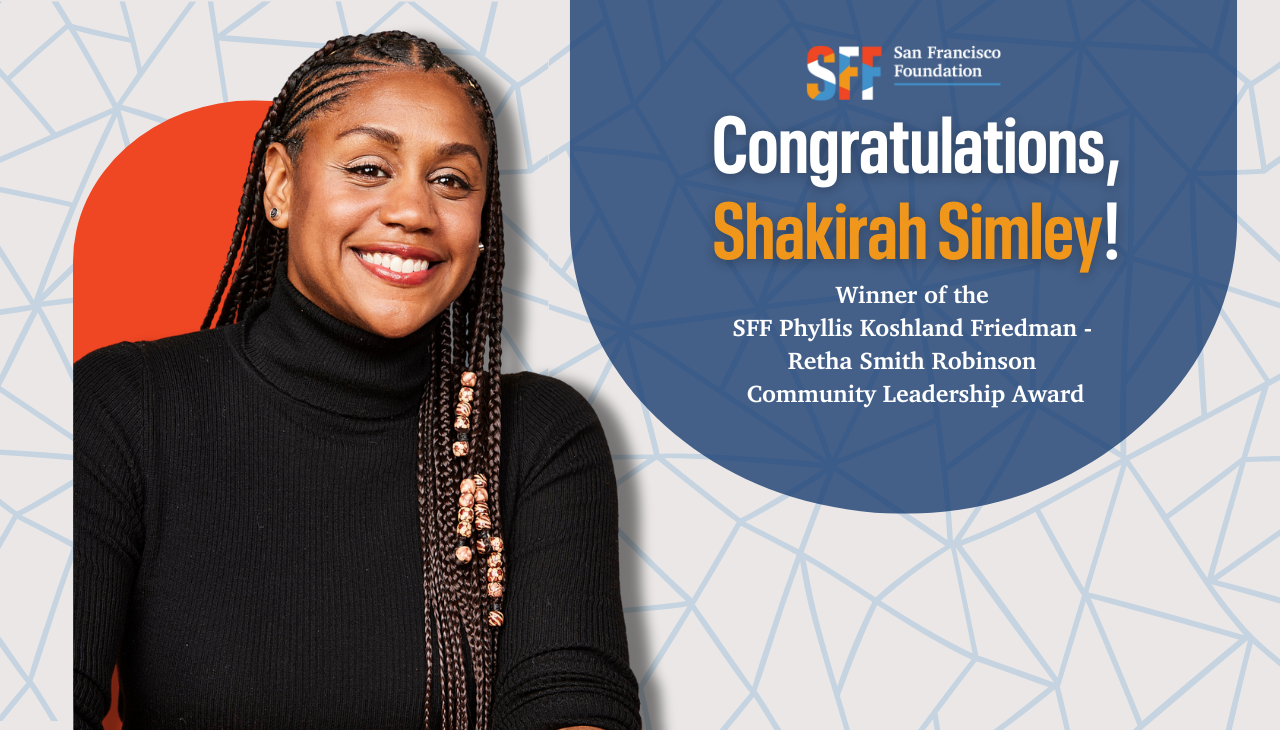Shakirah Simley is the 2023 winner of SFF’s Phyllis K. Friedman – Retha Smith Robinson Community Leadership Award. The award is named after the daughter of Daniel E. Koshland Sr. (SFF’s co-founder), and Retha Robinson, longtime SFF staff member and director of SFF’s Koshland Program. In 2023, this award recognized an emerging woman-of-color leader under 40 in San Francisco. Future awards will be given to women working in other Bay Area counties.
—–
Walking around the vast Booker T. Washington Community Service Center one afternoon earlier this month, Shakirah Simley is constantly making stops. She gets a long hug from a community member who tells her she did an amazing job on a two-day food justice event over the weekend. She double checks that the high school students, who are there for an after-school coding program, are making progress on a scholarship application that’s due in 10 days. She chats with a group of elderly women who are discussing their dinner plans in the lobby. “When you’re an ED, you’re a plumber, a therapist, and a scraper of gum off of the floor,” she says. “You’re an air traffic controller.”
Three years ago, Simley, now 39, became the center’s youngest executive director in its 105-year history. Originally founded as the “Victory Club,” in response to the tremendous need felt by returning World War I Black soldiers and their families, Mary Stewart, Rev. J.J. Byers, and John Fisher founded the center in the Western Addition on April 18, 1920. The oldest Black-led and Black-serving nonprofit organization in San Francisco, the center has served the Fillmore/Western Addition neighborhoods for six generations, creating an authentic safe space and “one door” for youth, seniors, and families (in 1951, SFF made one of its very first grants to the Booker T. Washington Center). Simley says her training for this role began at an early age.
Raised in Harlem, New York, Simley grew up watching her mom, a social worker, supporting community members living with HIV. She watched her grandmother, a former Black Panther, advocating for survivors of domestic violence and substance abuse. As the oldest of five siblings, she was often responsible for cooking dinner while her mom attended college classes in the evenings. Her early experiences watching her family struggle but still show up for community, sparked a lifelong commitment to education and fighting injustice. After training as a labor organizer and graduating from college with honors, she moved to California, where she worked on food and nutrition at a health nonprofit before starting her own jam business, and later leading community development programs for a local social enterprise.
From community food programs, Simley pivoted to several positions in city government, leading the redevelopment of the Southeast Community Center in Bayview, serving as a legislative aide in District 5, the inaugural director of the Office of Racial Equity, and the Chief Equity Officer for the city’s COVID-19 Command Center. There, she advocated for equitable access to services such as testing and vaccines for the city’s BIPOC residents and developed San Francisco’s racial equity framework.
When the opportunity came to lead the Booker T. Washington Center, Simley jumped in. The center’s range of programs are as vast as its 72,000-square-foot facility. Each year, 5,000 San Francisco residents, most of whom have experienced generations of systemic inequities, poverty and a lack of access to opportunity, come to the center for childcare, senior wellness programs, and just about everything in between. There is after-school tutoring, housing stabilization for homeless families, organic fresh produce for seniors, therapy and counseling, recreational programs in its state-of-the art gym, and 50 permanently affordable homes integrated into the center where transitional-aged and foster youth live, as well as seniors and working families. “Booker T. is love. You can walk in and feel, smell, and hear that you are cared for there,” says Stormy Henry Crayton, a Fillmore resident and longtime community leader who has been going to the center for nearly 40 years. “When your refrigerator is running low, you know that Booker T. has got your back.”
In her three years at the helm, Simley has quintupled the center’s operating budget from $1.4 million to $7.2 million, and quadrupled its staff from seven to 28. Community members credit the center’s growth to Simley’s inclusive, humble leadership, and her commitment to working with the community – and not on the community’s behalf. “This woman is the fairy godmother of Fillmore,” says Crayton. “And nobody knows it because she doesn’t boast, and she doesn’t brag. She’s a slice of humble pie.”
Simley is fiercely committed to her air traffic controller role leading the center, and ensuring that it continues to serve as an anchor in the community. In a city where the Black population has fallen from 11 percent in 1990 to 6 percent today, she is also fighting for the future of San Francisco. “Black San Francisco has always been resilient, and this center has always been a place that has kept us grounded,” she says. “We are preserving futures here. That’s what gives me hope.”


